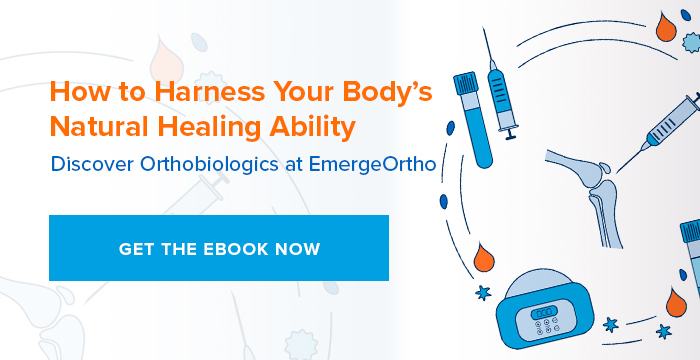
Many people are curious about a new form of regenerative medicine called Platelet-rich plasma (PRP therapy). Over the last decade, PRP therapy has emerged as an increasingly desirable, minimally invasive treatment option for several orthopedic-related conditions. Utilizing the body’s own healing mechanisms, PRP treatments address conditions such as acute and chronic ligament and tendon sprains, strains, and mild arthritis.
EmergeOrtho’s board-certified sports medicine physicians have specialized training and experience in providing PRP therapy for a variety of issues. We routinely use PRP for arthritis of the hands, sports injuries, and other chronic orthopedic conditions.
What Is PRP Therapy and How Does It Work?
Platelet-rich plasma utilizes an individual’s own red blood cells, extracting special growth factors that promote healing. Platelet-rich plasma first became popular in the 1990s for maxillofacial and plastic surgery purposes. Since then, its application in sports medicine has and continues to gain more traction. This is largely due to the treatments potential to enhance muscle and tendon healing. According to research, upwards of 86,000 athletes receive PRP treatments each year.
PRP treatments are so effective due to the potency of the connective tissue found in human platelets. An orthopedic physician obtains these growth factors by extracting them from the red blood cells. In order to fully benefit from these natural healing proteins, the platelets must be concentrated. This process takes place in a centrifuge machine.
Once the centrifuge separates out the concentrated growth factors, they can be injected into the damaged area. An EmergeOrtho-Triangle Region physician typically performs this process with the aid of direct ultrasound guidance. This ensures accurate placement of the platelet concentrate to the area of damage.
What Conditions Benefit from PRP?
Given the healing potential of the natural growth factors extracted from red blood cells, a number of health issues can benefit from PRP treatments. Take a look at several conditions that EmergeOrtho-Triangle Region specialists provide PRP treatments for in various areas of the body:
- Knee
Patellar Tendinitis, Patellofemoral Syndrome, Chondromalacia Patella; Partially torn or strained major ligaments of knee—Anterior Cruciate Ligament (ACL), Lateral Collateral Ligament (LCL), Medial Collateral Ligament (MCL), Meniscus Tears, Arthritis, and Patellar Instability. - Hip
Iliotibial Band Tendonitis (ITB Syndrome), Psoas Tendinitis and Bursitis, Gluteus Medius Tendonitis, Greater Trochanteric Bursitis, Hip Labrum Tears, Piriformis Syndrome, Sacroiliac Joint Dysfunction, and Arthritis. - Shoulder
Rotator Cuff Tendinitis or Tear, Rotator Cuff Impingement Syndrome or Bursitis, Bicipital Tendinitis, Labrum Tears, Arthritis, and Instability. - Wrist and Hand
De Quervain’s Tenosynovitis, Arthritis, Other Wrist or Finger Tendinitis, Ligament Tears, and Dysfunction of the Fingers. - Elbow
Elbow Tendonitis, Epicondylitis, and Arthritis. - Ankle and Foot
Achilles Tendinitis, Plantar fasciitis (fasciosis), Peroneal Tendonitis, Arthritis, Recurrent Ankle Sprains, and Other Foot or Ankle Tendinitis.
 PRP has also been shown to be helpful for various types of osteoarthritis. This is because PRP may help stimulate a “smoothing over” of roughened and arthritic cartilage. Studies have also demonstrated that PRP treatments are especially helpful in pain and disability associated with arthritis in the knee and hip joints.
PRP has also been shown to be helpful for various types of osteoarthritis. This is because PRP may help stimulate a “smoothing over” of roughened and arthritic cartilage. Studies have also demonstrated that PRP treatments are especially helpful in pain and disability associated with arthritis in the knee and hip joints.
How Often Do You Need Platelet-rich Plasma Injections?
The frequency of PRP treatment varies from person to person. After an initial PRP treatment, your EmergeOrtho-Triangle Region physician will likely schedule a two-week follow-up visit to evaluate your healing progress. While some patients respond rapidly in one treatment, others may require additional PRP treatments to aid the healing process.
Do PRP Injections Hurt?
There may be some mild to moderate pain following a PRP treatment. Your doctor may recommend a mild pain reliever such as Tylenol after the first week of treatment. It is critical to discontinue use of all anti-inflammatory medications (Advil, Motrin, Ibuprofen, Aleve, Celebrex, or Aspirin), for one week prior to injections and for two weeks after the procedure. These medications can interfere with the healing response. Those who must take prescribed anti-inflammatory medication for certain medical conditions may be exempt from these guidelines.
What Is the Risk, Versus Success Rate of Platelet-rich Plasma PRP Treatments?
One major benefit of PRP is that adverse reactions are rare due to its utilization of your own blood. With that said, any situation involving needles comes with the risk of infection, bleeding, and nerve damage. In the case of PRP treatments, however, these risks are minimal. Other complications vary depending on the area being treated. Your EmergeOrtho-Triangle Region physician will go over any potential risks prior to starting treatment.
As for the success rate of PRP, many clinical studies report positive outcomes. Some patients even experience complete relief of their pain. Plus (as an added value), the results are typically permanent.
Why Patients Choose EmergeOrtho-Triangle Region for PRP Treatments
Whether dealing with chronic pain, discomfort, reduced mobility, or other symptoms, EmergeOrtho-Triangle Region is dedicated to helping you return to a life of motion. PRP treatments are one of several options our board-certified, fellowship-trained specialists offer.
The best way to know for sure if you are a candidate for PRP treatments is to schedule a consultation with one of our EmergeOrtho-Triangle Region Physicians.
Although most insurance plans, including Medicare, do NOT pay for PRP injections, we will help you to devise a payment plan. To learn more, self-schedule an appointment now. Or, call us any time at (919) 220-5255.








